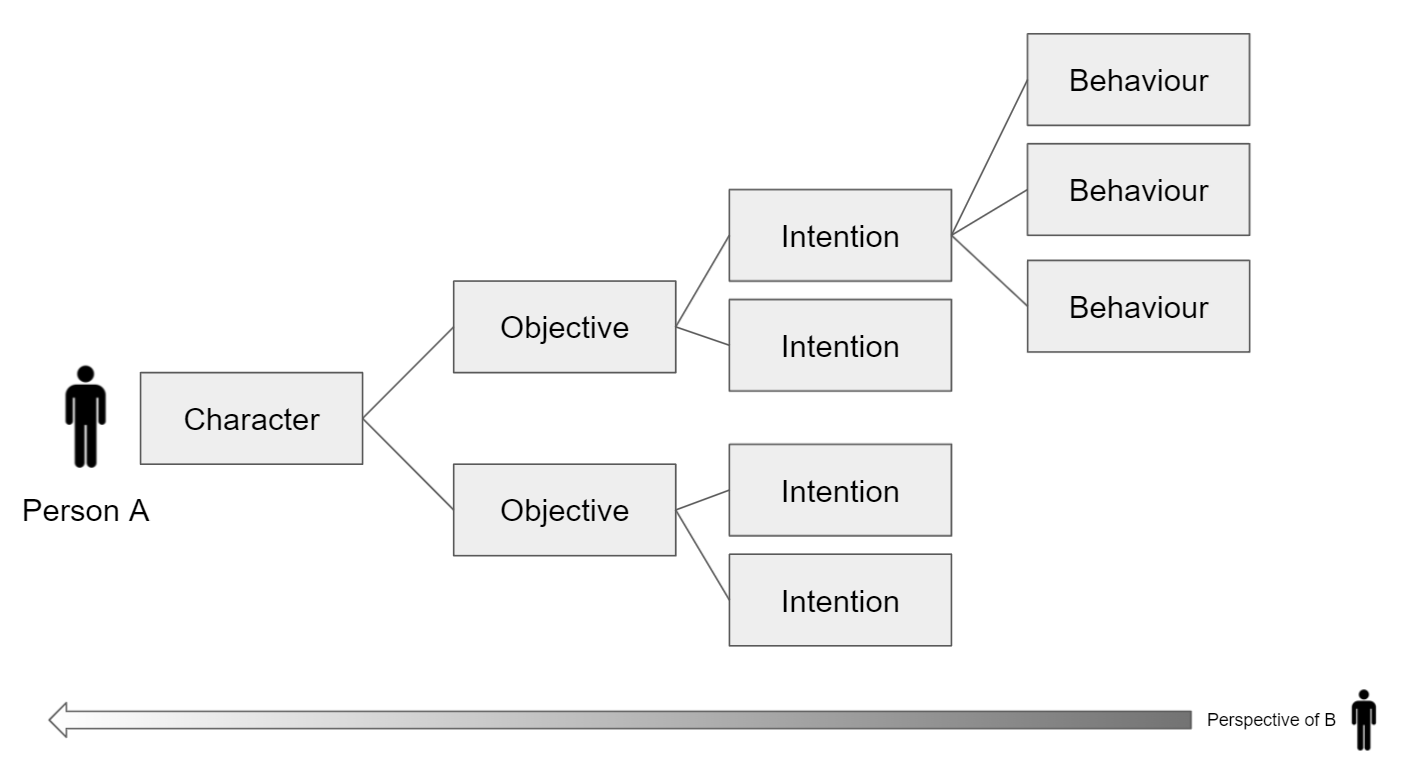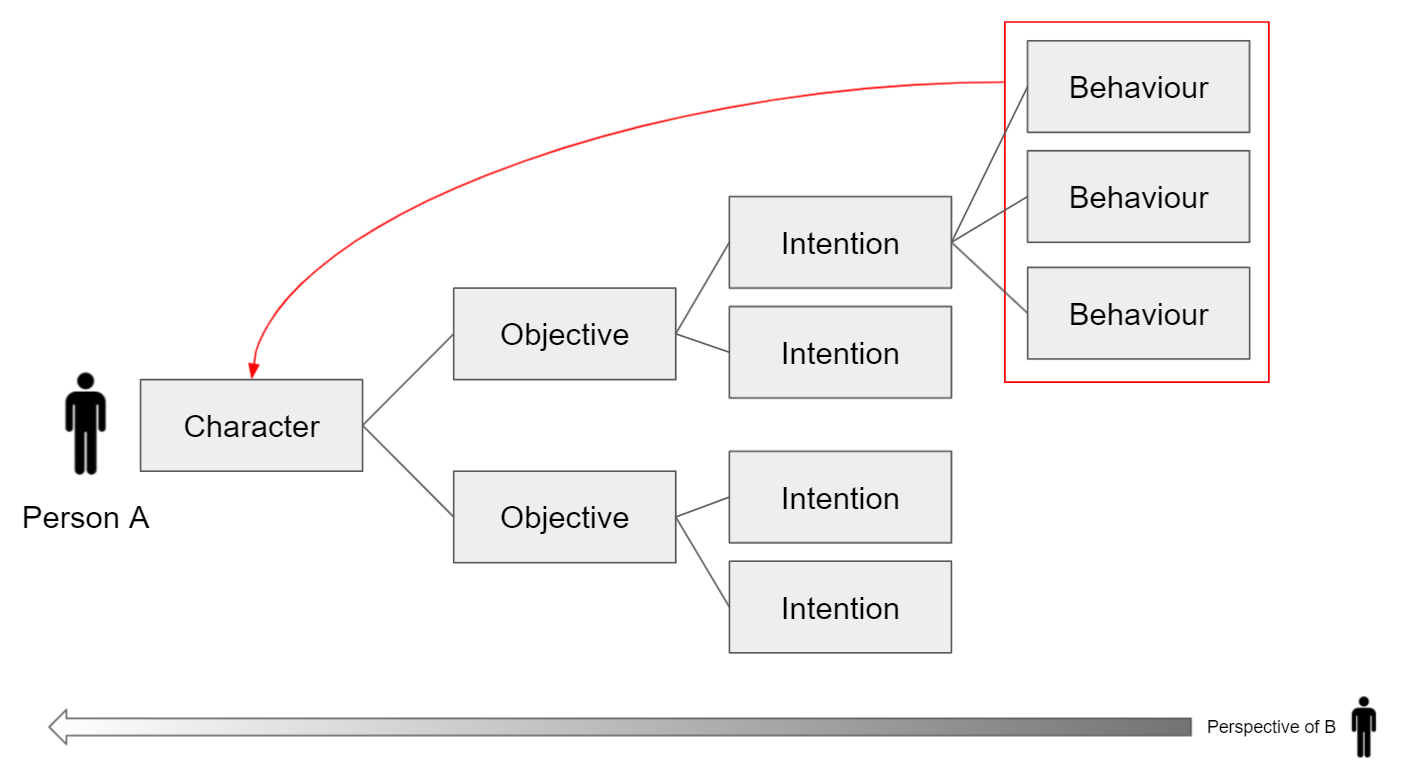The Case for Tolerance
Here, I present an argument for leaning in the direction of tolerating the behaviour of others.
Intolerance Leads to Bad Outcomes
We are often too intolerant of the behaviour of other people, even going as far as making assumptions about a person’s character. Making these swift conclusions can lead to bad outcomes, since we are more likely to:
- Assume the worst about someone, and act as though the worst case is true.
- Miscommunicate.
- Cast aside relationships with people, including family, friends and partners, due to our own misjudgment.
- Etc….
Understanding Character vs Behaviour
The diagram below is an outline of the steps I think may exist between a person’s character and the behaviour they exhibit.
Steps Between the Character and Behaviour of Person A
In this example, I present the perspectives of both Person A (the person his or herself) and Person B (an outsider).

Behaviour: Specific actions, utterances of a person.
Intention: The reasoning behind why someone exhibits a certain behaviour, in order to achieve an objective.
Objective: The conscious or subconscious goals of a person.
Character: A person’s intrinsic personality (at a specific point in time).
While Person A may have insight into their own character, their objectives/intentions and ultimately decide how to express themselves, Person B only has access to their behaviours.
This means that Person B has to infer much about the intentions, objectives and character of A just by examining their behaviours. This is highlighted by the left-facing arrow at the bottom of the image, where a darker colour represents the depth of understanding of each step from the perspective of B.
The case in which person B infers information about person A’s character based on their behaviour is seen below:

While it is commonly understood that it is wrong to make strong inferences about a person’s character from their behaviour (“Don’t judge a book by its cover”), I think we can make other inferences regarding intentions and objectives even if we don’t go as far as judging a person’s character.
Next, I’d like to examine this in more detail:
The Gaps between Behaviour, Intention, Objective and Character
Given a person’s behaviour, I think the following could be true from the perspective of person B:
- It is easier to understand person A’s intention than their objective.
- It is easier to understand person A’s objective than their character.
However, even taking the first step to understand the intention behind a person’s behaviour can be complex.
1. The way we express ourselves is influenced by (among other things):
- How we learned to act (culture, socialization)
- How we think others will perceive our behaviour
- Our state of mind, i.e. stress, lack of rest or more irritable than usual for some other reason.
All of the above will differ according to each person, meaning there is some chance that person B will misinterpret the intention behind the behaviour of person A.
But let’s say that person B correctly interprets a behaviour as being representative of a specific intention.
2. Intentions are complex and could be misaligned with objectives
- We are not always deliberate about intention. We may have certain objectives, but sometimes we simply haven’t thought about the reason why we act in a certain way.
- There could be many intentions behind a certain behaviour.
The distance between the character of person A and their intention could lead to an inconsistency between the two, which may not even be recognized by person A. This is further complicated by the following:
3. Objectives are malleable
While we’d like to think of ourselves as perfectly rational beings, this is not the case.
- We often have subtle subconscious objectives, such as social validation, that influence our conscious objectives.
- We often don’t explicitly derive our objectives from our character, since this requires deep introspection.
But let’s say that person B correctly interprets a behaviour as relating to an intention which serves a specific objective, it is still important to be conscious that:
4. Character is idiosyncratic
- Who we are is the result of our personal experiences, which is not easy to model if you are not that person.
- Our character is not fixed and can change over time.
So what does that mean?
Before we come to some judgment about a person, we should condition our judgment on a complex set of possibilities. Given uncertainty at each stage, we should lean towards tolerance.
I think this framework could also be useful in communication. You can talk in terms of an abstract intention rather than something fundamental about a person’s character, and slowly work your way towards a deeper understanding.
“The fact that you did x, shows just how y you are.”
versus
“I noticed you did x, can you help me understand why?”
Other comments
I noticed that this topic quickly became very complex, so I limited myself to a couple of reasons for uncertainty at each stage between Character and Behaviour.
Other questions I’d like to answer include:
- When we pass judgment on a person, do we judge their fundamental character?
- What constitutes character? Can it be described as a set of objectives?
- A deeper dive into the factors that affect character, objectives, intentions and behaviours.